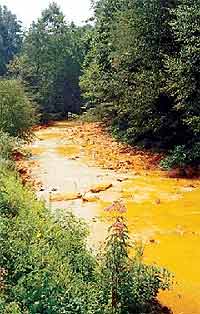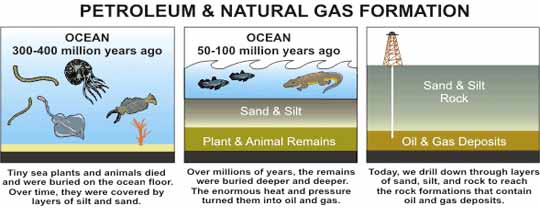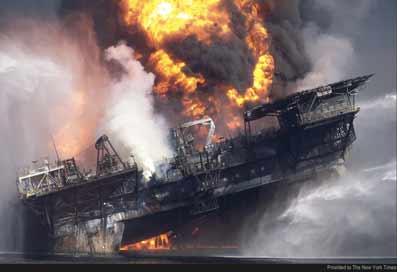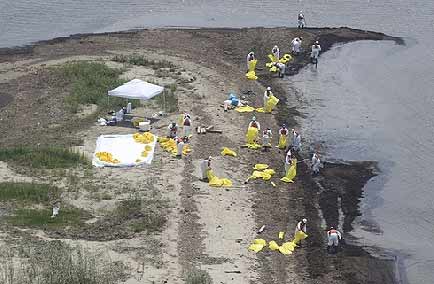Biblio
Southern Tier Landowners Coalition, Groups, and Associations. Includes online petition to support natural gas exploration.
"Southern Tier landowners are encouraged to join a Southern Tier Landowners Coalition, Group, or Association to negotiate better gas leases, obtain higher signing bonuses and royalties, and protection of your property and the environment."
West Virginians who live near streams polluted by coal mining are more likely to die of cancer, according to a first-of-its kind study published by researchers at West Virginia University and Virginia Tech.
The study provides the first peer-reviewed look at the relationship between the biological health of Appalachian streams and public health of coalfield residents.
See: Ken Ward Jr. "Breaking news: EPA vetoes Spruce Mine permit." Coal Tattoo. Jan. 13, 2011.
See: Mixplex | EPA in the Crosshairs.
See: Lisa P. Jackson, EPA (lisapjackson) on Twitter.
See: Nathaniel P Hitt. U.S. Geological Survey, Eastern Region, Northeast Area, Biology Discipline.
Hitt, Nathaniel P., and Michael Hendryx. “Ecological Integrity of Streams Related to Human Cancer Mortality Rates.” EcoHealth 7, no. 1 (March 2010): 91-104.
See: Nathaniel P Hitt. U.S. Geological Survey, Eastern Region, Northeast Area, Biology Discipline.
Energy companies believe they can more than triple the production of tar sands oil, but one of the main constraints is delivery: unless the tar sands fields are linked by pipeline to more markets, there is a limit to how much they can grow.
That barrier could soon be removed. The United States is already the biggest consumer of tar sands oil, and to expand the supply, companies have decided to build a new $7 billion pipeline that will stretch 2,000 miles from Alberta to Texas. We need to resist the siren call of a pipeline that will prove dangerous to our health and environment.
Decisions about pipelines rarely attract a lot of attention, yet they should, because they open up lands for gas and oil development. And every time we expand our fossil fuel infrastructure, we lock ourselves into a string of costly and potentially dangerous consequences...
See: Senator Mike Johanns. "Keystone XL Pipeline - Issues"
More than a dozen families in Susquehanna County, Pa., filed a lawsuit late Tuesday against the Southwestern Energy Production Company, asserting that a succession of “releases, spills and discharges of combustible gases, hazardous chemicals and industrial wastes” from the company’s nearby drilling sites had contaminated their drinking water and made them sick.
In simpler terms, it’s the latest salvo against hydraulic fracturing — a long-used and highly contentious drilling technique that has come under more intense scrutiny as energy prospectors descend on newly accessible gas deposits under vast areas of Pennsylvania, West Virginia, Ohio and New York.
It’s not the first such lawsuit, and it comes amid a flurry of other legal, regulatory and political maneuvering around the topic at the local, state and federal levels...
...A draft of the most recent lawsuit was provided by the law firm representing the Susquehanna residents.
The National Energy Technology Laboratory (NETL). Website: U.S. National Energy Policy Key Issues & Mandates, Secure & Reliable Energy Supplies.
See: Energy Policy Act of 2005.
"How much of our fossil energy will come from domestic rather than imported sources?
Can we realize the benefits of fossil energy while meeting environmental goals and controlling global climate change?
Can our energy infrastructure reliably deliver energy to the marketplace in the future?
Recent focus on U.S. energy price, availability, and security has resulted in publication of a number of studies and proposals for legislative action. Click here to read more about this issue."
A disturbing amount of the climate justice movement’s “action” is taken alone, within our own homes.
We sit at our computers and post, Tweet, comment and write op-eds. We call our Senators and legislators. We change our light bulbs and insulate our homes (literally and figuratively.)
The picture that naturally develops in our minds is of little me, sitting here fighting the world’s biggest corporations and their political stooges. That’s a pretty discouraging picture.
Despite all the attempts of social media to build “community,” everyone is still sitting alone at computers. We did not evolve to develop powerful relationships with an avatar, sending us an instant message.
That’s why a million screen names out there somewhere don’t help us deeply internalize the truth that we are part of something large and powerful. We evolved to connect with human beings that we can see, hear, smell and feel, and it is that kind of connection that empowers us on a deep level...
...The more I advocate for stronger and bolder action from climate activists, the more I see the need for real human connections. No amount of social media can match the empowerment of being in the streets with thousands of other people who share our passion. That’s why mass mobilizations that engage in bold action are so important for our movement.
Read joint letter explaining the urgent need for solidarity on December 13th.
See: "Student Disrupts Government Auction of 150,000 Acres Of Wilderness For Oil & Gas Drilling."
 For full interview click here.
For full interview click here.
See: Judge says drilling lease lawsuit too late
See: Tim DeChristopher's blog and update on his legal battle.
See: As climate crime continues, who are we sending to jail? Tim DeChristopher?
The Natural Resources Defense Council (NRDC) has 1.3 million members and access to the expertise of more than 350 lawyers, scientists and other professionals.
See: Endocrine Disruptors
What is an endocrine disruptor?
An endocrine disruptor is a synthetic chemical that when absorbed into the body either mimics or blocks hormones and disrupts the body's normal functions. This disruption can happen through altering normal hormone levels, halting or stimulating the production of hormones, or changing the way hormones travel through the body, thus affecting the functions that these hormones control. Chemicals that are known human endocrine disruptors include diethylstilbesterol (the drug DES), dioxin, PCBs, DDT, and some other pesticides. Many chemicals, particularly pesticides and plasticizers, are suspected endocrine disruptors based on limited animal studies.
Founded: 1970
Mission: To safeguard the Earth: its people, its plants and animals and the natural systems on which all life depends. Read more
-
Status: Not-for-profit, tax-exempt, membership organization
-
Staff: 300+ lawyers, scientists and policy experts
-
Supporters: 1.3 million members and e-activists
-
Offices: New York, Washington, Chicago, Los Angeles, San Francisco and Beijing
Related articles on the health aspects of environmental stressors.
See: TEDX — The Endocrine Disruption Exchange
But how clean is natural gas, really?
The Wilderness Society just released the new science and policy brief Doing it Right: Ensuring Responsible Natural Gas Development on Our Public Lands to address the question: How clean is natural gas?
Unfortunately, as the brief reveals, natural gas is not the panacea that its promoters would have us believe. Consider these facts:
Natural gas is only 30 to 50 percent cleaner burning than coal.
Natural gas is still a fossil fuel and our current use of it contributes about 20 percent of U.S. greenhouse gas emissions.
The processing, infrastructure, and burning of natural gas releases methane, a greenhouse gas 30 times more potent than carbon dioxide in terms of its heat-trapping ability.
Methane emissions from natural gas infrastructure are the third largest source of methane emissions in the United States, according to a September 2009 study by the Congressional Research Service.
Smog, or ground level ozone, has risen tremendously in areas with high levels of natural gas development. For example, in Sublette County, Wyo., after more than 3,100 gas wells were drilled in the past 10 years, ground-level ozone levels increased from background levels to those exceeding the Los Angeles basin in the winter of 2008.
The Wilderness Society is the leading American conservation organization working to protect our nation’s public lands -- the 635 million acres collectively owned by the American people and managed by our government.
Find out about our current conservation campaigns and how you can get involved.
Read more about the founding, history and role of science at The Wilderness Society.
Truthout is a source of independent journalism focusing on under-covered issues and uncoventional thinking.
In papers everywhere we hear arguments such as the one that appeared recently in the Rochester (NY) Business Journal, in an article by economist Raymond J. Keating, under the heading "N.Y. is missing out on economic opportunity."
Keating wrote, "Environmentalists are claiming that hydraulic fracturing threatens groundwater supplies and are using anecdotal evidence to support their claims. Yet years of evidence have demonstrated that the fracking process is safe."
This is not just misleading; it's artful misuse of the language. Or, as my mother would have put it in her habitually blunt way, it's a lie...
...If they have nothing to hide, and there is no danger, why do they keep the ingredients of their toxic fracking stews a secret? Why does the public not know what's in them? How can Keating or anyone else claim it's "safe" if we don't know what they're using? Do we want New York to be the next Gulf? Do we want to just trust the drilling companies to do the right thing, as we seemed to trust BP to manage a spill without adverse consequences?
Furthermore, do New Yorkers want their beautiful state turned into an industrial zone, a la eastern Colorado, huge swaths of Wyoming, much of Texas and Louisiana, and West Virginia? Take a drive to Northeastern Pennsylvania and see what the countryside looks like just a few years after horizontal fracking began there.
Well over half of these United States are in peril from fracking. This is simply nuts. It's not a local or regional, but a national issue (international now, as big gas deposits have been located, and in some cases are already being developed, in Poland, Austria, Hungary, Sweden, Ukraine, the United Kingdom, in Canada, China, and India. (Japan and other countries are buying into gas-drilling rights in the USA and elsewhere.)
See: Global Gas Flaring Identification in Google Earth
See: World of Shale
See: France to Unlock “Dirty” Oil Under Paris With Texan Help
The Independent Petroleum Association of America sent a letter (pdf) to EPA today highlighting two critics on the list of 82 potential panelists.
"Unfortunately, a number of nominees' past comments betray a strong and unambiguous antipathy toward shale development in general, and hydraulic fracturing in particular," IPAA President and CEO Barry Russell wrote.
The letter singles out two critics -- Theo Colborn and Robert Howarth. It does not give their names, but IPAA's detailed complaints about the two identify them.
Colborn is a Colorado zoologist and pharmacist whose group, TEDX — The Endocrine Disruption Exchange, has sought to document the damage that fracturing can do to water and human health. IPAA said she authored a "white paper" that called for federal regulation of fracturing.
Howarth is a Cornell University professor who issued a three-page draft report in April saying that shale gas production and use may generate as much greenhouse gas emissions as production and use of coal. Russell's letter said it was "riddled with errors."
See: U.S. EPA Initiates Hydraulic Fracturing Study | Meeting | EPA Science Advisory Board (SAB)
See: 2011 EPA Hydraulic Fracturing Study Plan Review Panel Selections.
See: Cornell’s Howarth Warns EPA on Shale Gas Greenhouse Footprint
Natural Gas Informational Site by the U.S. Department of Energy (U.S. DOE). Includes articles on How Do We Get Natural Gas?, How Was Natural Gas Formed? Also article on Energy Explained, Use of Natural Gas, Delivery and Storage of Natural Gas, How Much Natural Gas Is Left.
On May 22, 2010 President Obama established the National Commission on the BP Deepwater Horizon Oil Spill and Offshore Drilling through Executive Order 13543 issued on May 21, 2010.
Presentation of the findings and recommendations in the National Oil Spill Commission’s final report on the causes of BP’s Gulf rig blowout and prevention of future disasters will be held 11am EST, Tues., Jan 11, 2011 at the The National Press Club: 529 14 St., NW, Washington DC.
Viewing: Credentialed press only. Public viewing available via live stream at www.OilSpillCommission.gov.
See: The Ceres Principles | Mixplex
See: Before the Big Spill | Mixplex
See: BP Deepwater Horizon Committee Hears From Oil Industry Executives | Mixplex
A leading congressional critic of shale drilling is scolding the Obama administration for failing to try to slow drilling in the Northeast's Marcellus Shale.
Rep. Maurice Hinchey (D-N.Y.) fired off a letter (pdf) yesterday to the commander of the North Atlantic Division of the Army Corps of Engineers, Brig. Gen. Peter "Duke" DeLuca. DeLuca represents the federal government on the little-known but powerful Delaware River Basin Commission (DRBC), and he rebuffed Hinchey's request that he use his vote to block gas drilling there until a lengthy study is completed.
See: Keystone XL Pipeline - Issues
Both Hinchey and Johanns have been rebuffed by the President and the State Department. Might this be telling us about the direction the Administration is taking in regards to its Energy Policy? nz
See: Obama Admin Rejects Timeout for Natural Gas Drilling in N.Y., Pa.
See: What President Obama should have said about natural gas.
See: In Pa., Rove tells Marcellus shale drillers: Expect 'sensible regulation'
NYC Department of Environmental Protection
Communications & Intergovernmental Affairs. Department of Environmental Protection Calls for Prohibition on Drilling in the New York City Watershed.
Report finds gas drilling poses unacceptable risks to the unfiltered drinking water supply for nine million New Yorkers. Press Release. 12/23/2009.
"A faction of Northeast Ohio residents and lawmakers fighting for stricter regulations on oil and gas well drilling are getting outmuscled in the Ohio Senate and are turning their attention to the House. The state's powerful oil and gas industry, Gov. Ted Strickland's administration and lawmakers from outside greater Cleveland have teamed up to produce a set of rules its critics say don't do enough to protect homeowners living near wells."



























